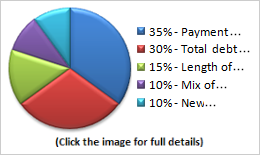Home > Active Credit Repair > Laws to Know During Credit Repair and Beyond
Laws to Know During Credit Repair and Beyond
Posted on November 2, 2010
Did you know there are laws that protect your rights before, during, and even after credit repair? Repairing your credit requires you to work with giant companies who have millions more dollars than you. These companies would have complete power over the credit repair process, if the government hadn’t put a few rules in place to keep these companies in check. The law isn’t perfect and some companies find loopholes, but knowing the law can help you get results.
Fair Credit Reporting Act
The FCRA is a law that generally dictates what can and can’t appear on your credit report. The FCRA says that information that’s inaccurate, incomplete, unverifiable, or outdated can’t be listed on your credit report. You have the right to dispute credit report errors either with the credit bureau or the company who listed the information on your credit report. That’s right, you can go straight to the source to get errors removed from your credit report.
You have the right to purchase your credit report from any of the credit bureaus or credit reporting agencies. An amendment to the FCRA lets you get your annual credit report every year through AnnualCreditReport.com.
Fair Credit Billing Act
The FCBA was created to help consumers correct billing errors from credit card companies. Billing errors include unauthorized charges to your credit card, unposted credits or payments, or charges for merchandise that wasn’t received as promised. You have 60 days from the date of the billing error to make a dispute directly to the credit card company. The credit card company must investigate the dispute. In the meantime, you don’t have to pay for the disputed charged and you can’t receive any penalty when you don’t pay.
Fair Debt Collection Practices Act
The FDCPA is a law that dictates what debt collectors can and cannot do when they’re collecting a debt from you. There’s a long list of things they can’t do. For example, they can’t call you before 8 in the morning or 9 at night, they can’t call if you’ve already told them it’s an inconvenient time, and they can’t call you at work if you’ve told them your boss doesn’t approve of those calls. They can’t tell certain other people about your debt, but can get location information from your friends, neighbors, and relatives.
Credit Repair Organizations Act
The CROA was created to protect consumers from unscrupulous credit repair agencies. Scams still happen, but many dishonest credit repair companies are caught and charged by the Federal Trade Commission. Credit repair companies can’t lie about the services they provide you, they’re not supposed to charge you upfront, and they can’t ask you to do anything illegal to “repair” your credit. If a credit repair company violates your rights, you can sue them for penalties and damages.
If you have a complaint against any business you’ve dealt with during the credit repair process, you can report them to the FTC by visiting www.FTCcomplaintassistant.gov or you can call 1-877-FTC-HELP. You can also report these businesses to your state Attorney General or local Better Business Bureau.
-Credit Repair Rights-
Free Credit Reports Available
Unfortunately this is one of the most confused topics for consumers because there are many third-party agencies that promote free credit reports that also have strings attached. These strings usually involve a paid membership in a credit monitoring or other program. In order to avoid unnecessary charges  and involvement in paid programs, consumers should request their reports only from annualcreditreport.com or by calling 877-322-8228. Written requests can also be made to: Annual Credit Report Request Service, PO Box 105281, Atlanta GA 30348-5281. Requests made to the individual credit bureaus may incur a fee so it is best to use the collective website or phone number for your request. Typically the fee to order a credit report outside of the free copy is between $10-$15.
and involvement in paid programs, consumers should request their reports only from annualcreditreport.com or by calling 877-322-8228. Written requests can also be made to: Annual Credit Report Request Service, PO Box 105281, Atlanta GA 30348-5281. Requests made to the individual credit bureaus may incur a fee so it is best to use the collective website or phone number for your request. Typically the fee to order a credit report outside of the free copy is between $10-$15.
Report Availability
Ordering your free credit report means you are entitled to receive one free copy of your credit report from each of the major reporting agencies – Experian, Equifax, and TransUnion within a 12 month period. You are able to request a copy of each all at the same time or during different times of the year, provided you only request one copy from one credit bureau within the year’s time period. You are also entitled to a free copy of your credit report for a period of 60 days once you have been denied credit approval. If you apply for a loan and are denied, you have a right to request a copy of the credit report used by the bank issuing the denial.
Report Contents
Your free annual credit report contains your name and contact information, former addresses, list of all your creditors, their contact information, and financial data pertaining to your available credit, balance outstanding, and type of credit account you maintain. This information basically covers the last 7-10 years of your credit activity – good or bad. The free report will not contain your credit score. You must obtain that separately for a typical charge of around $15.
What To Do Now
Whenever you receive a credit report, it is important to check over every line for accuracy. There is no way to erase information on your credit history that is accurate but erroneous information can be changed, corrected, or eliminated depending on the outcome of the credit bureaus investigation. You have the right to dispute any information that is not correct. The credit bureau will investigate and negative information will be removed. There is no charge to dispute the information.
Following Up
Once a dispute is filed, a 30 day period of time is allowed to pass for the investigation is completed. If a creditor does not respond to an investigation, the information must be deleted. Changes made to correct your credit history information may have a positive impact on your credit score. Consumers are encouraged to check reports and scores several months after disputes are filed to recheck the data. Human error is common on credit reports so a consumer has the obligation to ensure their credit items are correct and up to date.
Similar Posts:
- Are Credit Report Disputes Pointless?
- The Power of Debt Validation and Credit Repair
- How To Construct a Credit Dispute Letter to Your Creditors
- Credit Repair Don’t: Dispute Everything On Your Credit Report
- Putting Together a Credit Repair Plan







Let's connect!